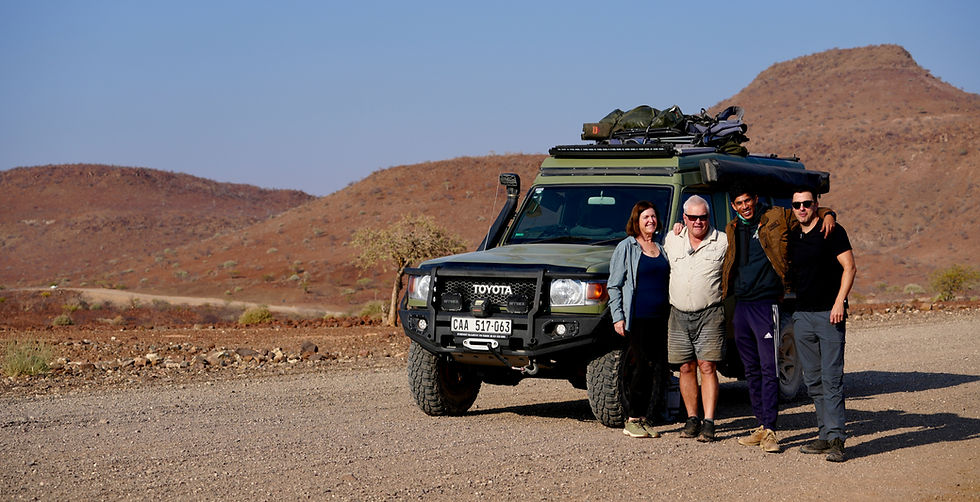Gashaka Gumti: A Park at a Crossroads, and a Future Within Reach
- paulfunston40
- Apr 14, 2025
- 3 min read
By Dr. Paul Funston
Nigeria’s largest and most ecologically diverse national park, Gashaka Gumti, is one of West Africa’s best-kept secrets. Towering montane forests, rolling savannas, and deep valleys once teemed with wildlife, from elephants to Derby’s eland, from leopards to lions. But today, while the landscapes remain breath-taking, much of the wildlife has vanished. The lions are gone, and what’s left is a park under pressure—but full of possibility.
I recently spent time in Gashaka Gumti working alongside the Nigerian NGO Africa Nature Investors Foundation (ANI) to assess the park’s condition and contribute to the development of a Grazing and Fire Management Plan as a basis for recovering the park. What we found was both deeply sobering and surprisingly hopeful.
🐄 A Park Grazed to Its Limits
In the dry season the park is home to over 63,000 cattle. Many are owned by Fulani pastoralists, both residents of legal enclaves inside the park and seasonal herders crossing borders from Cameroon and beyond. Others graze illegally with the quiet support of local chiefs and outside elites. These cattle, and the annual burning practices used to clear grass for grazing, have transformed Gashaka’s savannas and forests.
Grasslands are now dominated by fire-adapted, nutrient-poor species.
Soil is degraded, with visible erosion and bush encroachment.
Fires rage annually, often uncontrollably.
Native wildlife—buffalo, waterbuck, even leopards—are clinging on in pockets, but many species have disappeared entirely.
🔥 A Landscape Shaped by Fire
While fire is a natural part of savanna ecosystems, in Gashaka it has become a blunt tool. Pastoralists light early dry season fires across much of the park to stimulate fresh grass for cattle. But with no wild herbivores left to manage the growth, and too few rangers or fire teams to control the flames, the result is widespread ecological simplification.
Ironically, the people causing the fires today, local pastoralists, also have the knowledge and skills to help fix it. And that’s where partnerships matter.
🌍 ANI: A Nigerian NGO With a Vision
Africa Nature Investors Foundation (ANI) has taken on one of the most ambitious and underappreciated conservation projects in West Africa: restoring Gashaka Gumti. In just a few years, ANI has:
Deployed and trained ranger teams
Improved community engagement and conservation awareness
Worked to secure alternative grazing areas
Developed a bold strategy to remove cattle from the park, allow the land to rest and regenerate, and manage fire and grazing in a sustainable, science-based way
This is not theoretical. It’s happening on the ground. And I was proud to contribute to this momentum.
🦁 Will Lions Return?
Lions once lived here. And they still roam across the border in Faro National Park in Cameroon. If the veld is allowed to rest, and wildlife begins to return, either through reintroduction or natural recolonization, there is every reason to hope that lions, too, could find a place in Gashaka once more. But that future depends on action now.
🤝 A Landscape That Needs Support
Gashaka Gumti is not just a park. It’s a possibility. A test case for conservation in one of the world’s most populous nations. A chance to align ecological recovery with community benefit, and to build something lasting. But ANI cannot do it alone. Nor can the Nigerian Park Service. It will take donor support, government commitment, and shared vision to fully realize Gashaka’s potential as a carbon sink, a wildlife refuge, and a symbol of restoration.
For now, we begin with the basics:
🛑 Stop the degradation.
🔥 Manage fire with care.
🌾 Remove the cattle.
🌿 Let the land breathe.
And then… maybe the lions will find their way home.
📸 Photos by Dr. Paul Funston
🌍 Learn more about our work: [www.africanlionconservation.com]
🔗 Partner with ANI: [www.africanatureinvestors.org]




























Comments